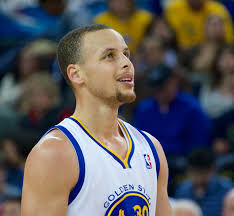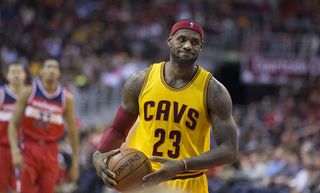
Attention
The Secret Psychology Behind the NBA Finals
How Steph Curry and Lebron James Mentally Prepared To Compete
Posted June 10, 2018
The Warriors have done it again. With Steph Curry's leadership, they swept the Cavs. There is no question that innate physical talent and team composition play big roles in who wins these contests of champions in basketball. That said, it’s a mistake to ignore the immense mental aspect of the same. Like the MLB and NFL, NBA teams are increasingly using the services of sport psychologists and mental skills coaches.
Most professional basketball players have a deliberate, practiced psychological approach to the game. What makes Stephen Curry of the Golden State Warriors and Lebron James of the Cleveland Cavaliers different in terms of their personal psychology, mindset, and mental training:
Steph Curry

More than many elite athletes, Steph Curry pays special attention to training in all aspects of his performance. He works on his mindset constantly and has a very different perspective for practice. For example, Curry does “neurological drills,” which use highly engineered simulated game situations to allow him to mentally “overload” so that he can increase his awareness and get into a flow state more easily in actual games.
University of Central Florida sports scientist Jay Hoffman explains, “It's the cutting edge of sport performance. It’s being able to look at multiple stimuli on a court…seeing not just where your teammates and their defenders are, but, like a judo master, recognizing where your defender’s body is in space and using it against him. Curry “has the ability to see [all that stimuli], and get somebody into a position that’s favorable for him. This is what separates great players from good players.” This practice is by definition, deep or deliberate practice. It's purposeful practice. The kind that Daniel Coyle wrote about in the talent code.
This type of practice is consistent with the research of Anders Ericsson. His work suggests that we learn most when the practice requires intense, close attention to minor physical and cognitive adjustments. This mentally focused practice allows Curry to have a greater ability to use his brain to “read” the moves of his opponents. His trainer calls it “neurocognitive efficiency.” Some even believe that this intense preparation gives him the psychological and spatial awareness tools akin to a bat! Look out, Batman, here comes Steph!
Curry has incredible routines
These routines don’t just include a neurocognitive component. They involve an emotional one as well. These routines start way before the game. During his pre-game practice, he has a regular interaction with a well-known security guard in which he shouts, “Warrior coming out. Hold them up." This was routine in which the guard used to shout this phrase, but now, Curry picked up the responsibility. It’s a method for him to become alert but also to stay playful and relaxed. The guard himself said about Curry, "This is all part of the process. Other players are more intense; he likes to keep it loose." Many players know that paying attention to their mindset and physiological arousal will help them to stay psychologically “loose," but few experiment with techniques and methods to increase the actual likelihood that they will be loose. Curry does, and it leads him to an ideal mental performance state. "I do get in a zone out there," he has said.
Curry also involves his family in this pre-game routine. He focuses on them to help remind himself of perspective and what’s important. Check out his mindset focusing pre-game routine with his wife and daughter. If that isn’t cuteness overload for you, here he is again dancing with her.
He's fiercely motivated
However, as most people know, he didn't always have this level of NBA Championship success. Despite his intermittent struggles, his college coach said that he had a "fire that raged within him." Simply put, he never gave up. "I really couldn't shoot outside the paint for like the first three weeks. All summer when I was at camps, people were like, 'Who are you, why are you playing basketball?' I was really that bad for a month and a half [before] I finally figured it out." "He's always constantly pushing himself to make shots challenging so that when he gets in the game, he's done that a lot," said Bruce Fraser of the Warriors.
He has a coach that believes in him and gives him autonomy
Even from the beginning, the Warriors head coach, Steve Kerr, worked to develop a relationship with his new star player. "[Coach Kerr] did a great job over the summer of reaching out to every single player, getting to know us, talking about what his expectations were, which made us a little more comfortable, for sure. …He did a great job during training camp of keeping it light, keeping it fun, doing some things that are different," Curry has said. Even with the most talented among us, self-efficacy, the belief we can perform at our best and the knowledge that others believe it too, is a big part of the winning recipe. That said, Kerr was able to deliver effective non-judgmental feedback in a strength-based way to help Curry become the best teammate he could become. "We have [challenges] as a team; it's not just Steph. The challenge is, Steph is so talented. He can do anything he wants with the ball. And I think it's harder for guys like that to become great decision makers, because they always see something that they can do. And they're right. They can do it. But it's all about risk management -- when to go, when not to. I think he's still learning that."
Steph Curry is undoubtedly one of the best basketball players of our time. He has used his mental preparation to reach his full potential. As his collaboration with Kaiser Permanente suggests, train the mind … the body will follow.
Lebron James

Although defeated in game four of this season’s NBA finals, Lebron James is perhaps one of the hardest workers in basketball with regard to the training of his mindset. What makes him so great psychologically?
Mental preparation for opponents
Lebron is known for the time that he takes to prepare mentally for each opponent. He analyzes how they think and then applies the information he deduces to his game plan and leadership style.
He’s resilient, playful, and growth mindset oriented
As Carol Dweck’s research shows, those who keep learning, are open to new information, and view stressful situations as challenges rather than threats, do better in many aspects of life. Lebron is always looking for an opportunity to prove himself and to put himself to the test.
He moderates the influence of social media and technology
Most clinical and sport psychologists agree that an overload of media can be distracting and lead to detrimental effects on performance, concentration, and even mood. King James knows this and finds way to limit his use of technology including taking complete breaks from screen time. Especially when it counts.
He has a solid, healthy personality
There are some who think that he is narcissistic. In spite of some of his curt responses to the media, there is considerable evidence to the contrary. In fact, some of the behaviors that he engages in, including referring to himself in the third person, could be attributed to part of his training to gain perspective. Referring to oneself in the third person is a widely used mental skills technique in a variation of self-talk. It is also related to the non-judgmental compassion practice in mindfulness. We all know Lebron is a fan of mindfulness and this is one of the other reasons I believe he can consistently play his best; win or lose.
In the end, this was a losing season for Lebron James. But he shows us his personal psychology and character in his ability to show kindness when it counts. This can be seen in the way he treats players who make a mistake, like JR Smith. Steph Curry and Lebron James are champions not only because they win in basketball, but also because they champion the power of the mind and mental training in making us all great, no matter where or what we play.
Share Your Thoughts With Dr. Fader on Twitter



